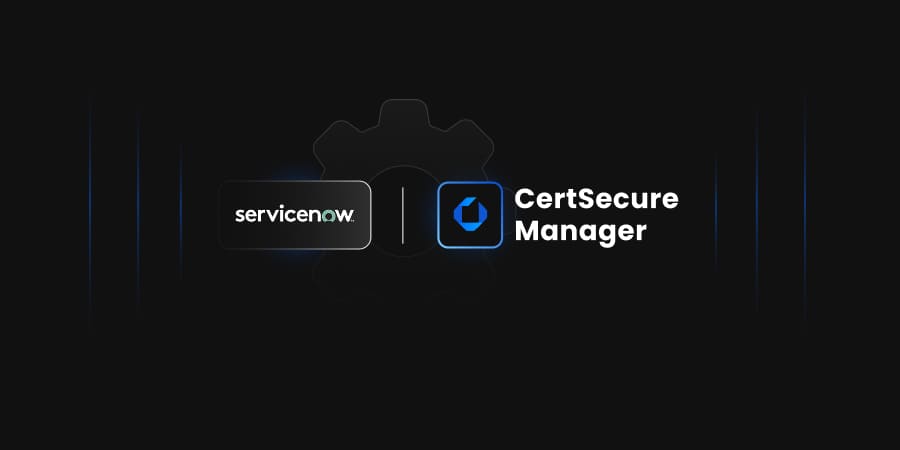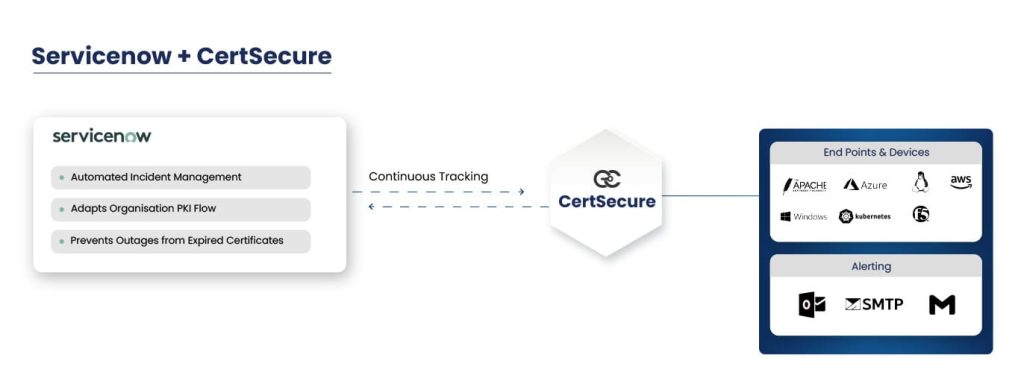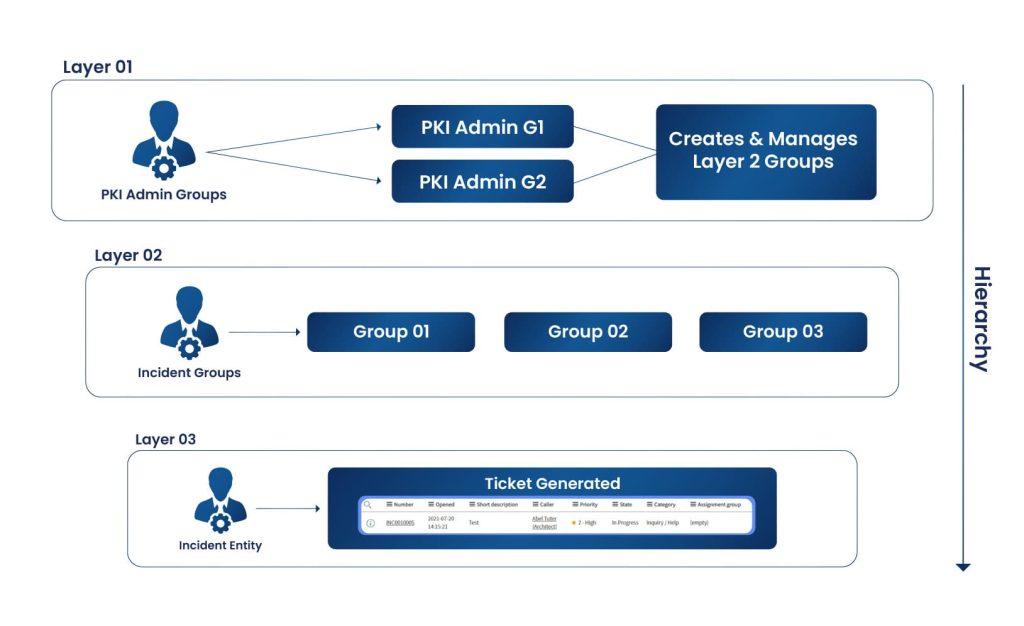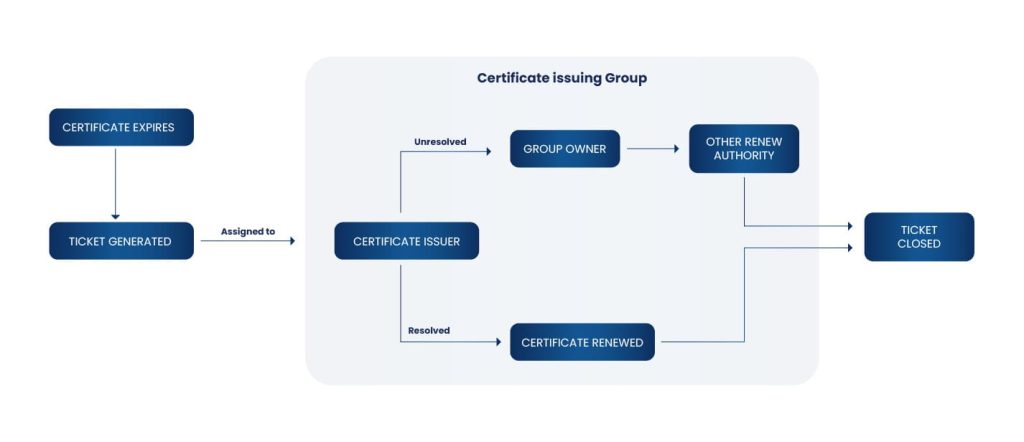Certificate Lifecycle Management
Enhancing Digital Certificate Management with CertSecure’s Service Now Integration

Certificate Lifecycle Management

The proliferation of digital certificates within enterprises is a consequence of the complex nature of modern IT environments. As organizations aim to secure various components, such as servers, computing devices, and user identities, the escalating number of certificates has presented a significant challenge. Managing and monitoring this expanding terrain across multiple platforms has become a formidable task for many enterprises.
Being a Certificate Management solutions provider, we understand the significance of managing digital certificates and the challenges associated with it. Thus, in our pursuit of making CertSecure Manager, a certificate lifecycle management (CLM) solution that is faster, simpler, and more precise, several key concerns and challenges arise in ensuring comprehensive visibility and control of the huge certificate portfolio. Delving into these challenges, we begin by addressing the following pivotal concerns:
In today’s modern IT infrastructure, the ubiquity of digital certificates has become indispensable, with everyone from developers to end-users requiring them. Consequently, the sheer volume of certificates being issued has reached an unprecedented scale. However, the challenge of managing this ever-growing certificate portfolio extends beyond mere issuance; it encompasses the crucial aspects of ensuring the validity and trustworthiness of each certificate.
This intricate process not only makes certificate management laborious and time-consuming but also introduces potential risks. This complexity can lead to issues such as expirations and outages if left untracked.
In addition to the challenge of tracking the ever-growing certificate portfolio, another significant issue surfaces. The issue stems from the absence of a clear display indicating which certificates have expired and the need for foresight regarding upcoming expirations. The Certificate management solutions fail to provide a real-time mechanism to identify expiring certificates, leaving us without a proactive means to prevent potential outages. The lack of a tangible indicator or identifier for impending expirations exposes the system to unexpected disruptions. Manual tracking and keeping spreadsheets for a portfolio of this magnitude introduces the risk of human errors and inefficiencies, underscoring the need for an advanced solution.
Another challenge that arises within the realm of certificate expiration alerting solutions lies in their limited effectiveness. While these solutions can promptly alert designated entities about certificate expirations, a crucial gap emerges in the absence of a comprehensive issue-tracking system. Picture a scenario where a certificate expires, triggering an alert to the designated entity. Unfortunately, this process lacks a mechanism for generating a corresponding ticket that tracks the issue’s lifecycle.
Moreover, a significant deficiency lies in the absence of a trackback or fallback algorithm for instances where a response to the issue resolution is not received. This deficiency hampers the overall efficiency of the alerting system, leaving a critical aspect of certificate management unaddressed and potentially leading to delays in resolution and increased security risks.
With all the issues and challenges addressed above, this is where CertSecure Manager’s Service Now integration comes into play.
CertSecure Manager is a CLM solution by Encryption Consulting. It addresses the most critical challenge organizations face in managing PKI environments. As the number of digital certificates increases, it becomes a tedious task to manage the sheer number of digital certificates. With the High-Availability (HA) architecture of CertSecure Manager, connector clients can effortlessly integrate all the public and private CAs with the CLM. This provides a single pane of glass for managing all the certificates across multiple CAs. It also makes sure that no CA, be it a multi-cloud setup or a public-private combination, is missed and can be easily integrated with CertSecure.
CertSecure Manager also provides the option of Renewal Agents, which can be integrated with servers like IIS and Tomcat and load balancers like F5. These agents make sure that the certificates used are active and auto-renewed prior to expiration. The discovery capability makes sure the user knows about all the certificates underlying your web server, be it installed in any partition of the device. Clients can also integrate their own solutions with ACME or Rest APIs, which will make it easier to get certificates for their applications.

The Service Now integration assists the connected organization in configuring its Service Now instance with CertSecure. This integration is strategically built on top of role-based access control to ensure a more precise identification of individuals responsible for certificate administration within the organization. Leveraging RBAC simplifies the assignment of roles and grouping of users, providing a straightforward and manageable method to allocate distinct roles. This functionality enables the system to categorize users into distinct roles or layers based on their permissions and access levels, facilitating a more organized and secure certificate management structure.
The integration addresses several key benefits:
Furthermore, Service Now addresses the persistent challenge of tracking certificates at any given time. This functionality significantly streamlines the renewal process; upon certificate expiration, a meticulously generated ticket is promptly assigned to the relevant group, subsequently progressing to the issuer for resolution. This systematic approach ensures a smoother and more efficient certificate renewal workflow within the integrated CertSecure environment.
ServiceNow plays a pivotal role in overcoming the challenge of managing an ever-growing certificate portfolio. While the certificate data is stored in the centralized database, ServiceNow enhances this process by automating and streamlining the entire lifecycle. The platform acts as a dynamic orchestrator, automating routine tasks such as tracking certificate validity and ensuring timely renewals.
This precision-driven automation minimizes manual intervention, reducing the risk of oversight and fortifying the efficiency and accuracy of our certificate management process.
ServiceNow’s integration tackles the Certificate Expiry Foresight Gap by introducing automated tracking, alerting, and fallback mechanisms for each certificate. The role-based access control (RBAC) functionalities ensure precision in assigning responsibilities and roles to all the grouped users. Additionally, ServiceNow’s automation capabilities enable the platform to send automated alerts, notifying designated groups and, in turn, designated users well before impending certificate expirations.
This clarifies the lifecycle management workflow for each certificate, effectively closing the foresight gap.
ServiceNow significantly improves the alerting system’s efficiency by creating incidents for each expiration issue. Through the integration, ServiceNow automatically generates tickets when certificate expirations are detected, both well in advance at intervals such as 7, 30, 60, and 90 days, and promptly in case of expiration. This approach ensures that every expiration is logged and tracked in the system.
Moreover, the system incorporates a fallback algorithm, a crucial component of incident management. When a response to the issue resolution is not received, the defined fallback algorithm kicks in, ensuring a systematic and reliable resolution process.

The integration’s architectural framework is strategically divided into three fundamental layers: the Admin layer, the incident group layer, and, ultimately, the incident ticket entity itself. At the pinnacle, the Admin layer oversees all administrative groups, taking charge of the comprehensive management of the second layer. These layers function hierarchically, progressing from a broader scope of access control in the Admin layer to a more specific focus on the incident ticket entity.
The Admin layer orchestrates the overall administration of groups, followed by the incident group layer, which concentrates on group-specific activities. These are the groups responsible for the meticulous management and resolution of incidents related to certificates. Finally, the incident ticket entity encapsulates the precise details related to certificate expiration, creating a structured and organized approach to incident resolution within the Service Now integration.
An advantageous aspect lies in the alignment with existing organizational workflows, where established processes and administrative policies seamlessly integrate. This consistently ensures an efficient workflow, starting with the initial layer and mirroring it for subsequent layers.
Diving deeper into the mechanics of how tickets are assigned and managed within an incident group, specifically the renewal process of expired certificates. When a ticket is generated for an expired certificate, it is promptly assigned to the issuing group. This incident group is responsible for addressing the ticket and overseeing the renewal of the expired certificate. Notably, tickets are generated well in advance, at intervals of 7, 30, 60, and 90 days before expiry, as well as promptly after certificate expiration.

The ticket’s lifecycle operates on a straightforward policy: initially, it is assigned to the certificate issuer or the designated certificate entity. Once the identified issue is successfully resolved, marking the successful renewal, the ticket is officially closed. However, in instances where the ticket remains unresolved for a specified duration, it undergoes an automated reassignment process. In such cases, the ticket is redirected to the group owner, who has the authority to assign it to the relevant entity responsible for resolving the outstanding issue. This structured workflow ensures a systematic and responsive approach to handling incidents related to certificate renewals within the integrated CertSecure environment.
In conclusion, integrating CertSecure Manager with Service Now offers a comprehensive solution for the challenges associated with digital certificate monitoring and management. The architectural framework of integration is organized into layers, from the administrative control to the specific incident ticket entity, which ensures a seamless workflow aligned with existing organizational processes. CertSecure, in collaboration with Service Now, not only navigates the complexities of digital certificate management but also establishes a structured and adaptive framework for incident resolution. This integrated approach significantly simplifies the tracking and renewal process of CertSecure, automating the alerting and incident management. It effectively resolves issues related to lifetime tracking, expiry foresight, and unclear workflow of certificate renewal. Thus, CertSecure’s integration with ServiceNow provides an efficient certificate lifecycle management solution.
CertSecure has a comprehensive suite of lifecycle management features. From discovery and inventory to issuance, deployment, renewal, revocation, and reporting, CertSecure provides an all-encompassing solution. Intelligent report generation, alerting, automation, automatic deployment onto servers, and certificate enrollment add layers of sophistication, making it a versatile and intelligent asset.